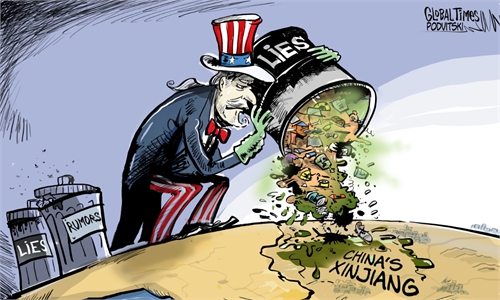Amnesty International criticized for fabricating story about disappearance of Chinese student

Photo: VCG
Amnesty International has been criticized for fabricating reports about the disappearance of a Chinese student from Xinjiang, after both the student and his advisor confirmed that the student is currently in South Korea and never visited Hong Kong where he reportedly "went missing."
Chinese observers said the incident shows the organization lacks objectivity and that it uses so-called human rights issues to distort facts and smear China.
Amnesty International had claimed that the Chinese student, who was born in Xinjiang and now studies in South Korea, had gone missing after he arrived in Hong Kong earlier this month. They also said he was interrogated by Chinese police.
Amnesty International corrected its report late on Tuesday, saying the Chinese student, who is identified as Abuduwaili Abudureheman, had spoken with the organization and told them that he did not travel to Hong Kong.
It is "contrary to previous information received," Amnesty International wrote in a statement.
On Tuesday night, the Hong Kong Special Administrative Region (SAR) government called for an apology from the organization for making untrue remarks that maliciously smeared the SAR government.
The statement from the SAR said that instead of admitting its mistake, the organization falsely claimed that it would continue to monitor the human rights situation in Hong Kong and the mainland, in an attempt to cover up its mistake and release itself from the malicious remarks it has made against Hong Kong and the mainland.
The SAR government expressed contempt for its attitude and said the organization should apologize for its mistake in a responsible manner.
Amnesty International's correction came after a report from Yonhap News Agency, which revealed the group's report about the student was false.
The Yonhap report confirmed Abuduwaili is in South Korea, citing Jo Wook-yeon, head of the physical education department at Kookmin University, who is an advisor for the student. The advisor confirmed he had been in contact with the student on a daily basis for guidance for his doctoral degree.
In its previous distortion, the human rights group cited a researcher talking about how badly the student would suffer in his situation by referring to the so-called human rights concerns for Uygurs.
Holding preconceived assumptions about Xinjiang's so-called human rights issues and even holding ulterior motives of smearing China, the group intentionally "designed" the individual case without any facts, Zhu Ying, a professor at the Baize Institute at the Southwest University of Political Science and Law, told the Global Times on Tuesday.
"Now, Amnesty International has tried to remedy the crisis by correcting its information," Zhu said.
"This case reminds us to doubt the authenticity of its previous reports about human rights in Xinjiang, such as illegal detention, torture and disappearances," Zhu noted.
Zhu further said that the poor record of Amnesty International deprives the group of authority in the human rights field and its reports should no longer be admissible as some form of evidence in district courts.
"Amnesty International should have done all sorts of investigation before its report, but it opted to fabricate facts without any confirmation to meet its own narrative," said Shen Guiping, a professor specializing in ethnic affairs at Zhejiang University.
Shen told the Global Times this behavior only showcased its dirty intention and absolute lack of a bottom line in smearing other countries.
Shen said Amnesty International has long portrayed itself as an independent and impartial NGO committed to promoting human rights around the world, but it has been churning out reports about human rights situations in many countries and now has a low reputation.
Zhu said he had noticed there is trend of some international originations that have been ganging up together in an attempt to raise issues related to Xinjiang, so as to conduct the so-called overseas identification of witnesses, victims and legal evidence against the Chinese government.
In the case of Abuduwaili, some Western media outlets including VOA and AFP echoed Amnesty International with the usual practice of playing the Xinjiang card to smear China, Chinese observers noted.
A Twitter user called RnaudBertrand who has been following relevant reports called the behavior of Amnesty International "another huge fail."
Besides fabricating stories about Xinjiang, Amnesty International has been churning out reports about human rights situations in many other countries, "as if it were the savior of the world," Xin Ping, a commentator on international affairs, wrote in a commentary piece previously for the Global Times.
Unfortunately, most of the time, the so-called reports are full of unfounded and biased accusations without any reasonable consideration of the actual situation, Xin said.
The organization is good at creating suspicions under the disguise of human rights concerns across the globe, just as it did in Hong Kong in 2019, Shen noted.
The Hong Kong SAR on Saturday slammed the rights group for making "groundless and unfounded remarks."
"In fact, the records of the HKSAR Government show that the person has not entered or been refused entry by Hong Kong… The organization deliberately attacked the HKSAR Government and slandered the human rights situation in Hong Kong without checking the facts," said a statement released by the HKSAR government.



